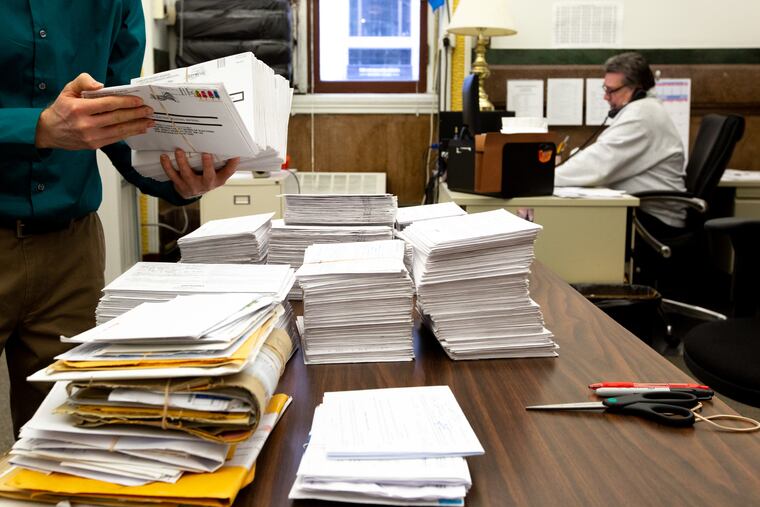Are Pa.’s absentee-ballot deadlines unconstitutional? What would be the fix? Judges consider whether a lawsuit should move forward.
“Just because our state may not have the best system does not mean we have an unconstitutional system,” a judge said.

Thousands of Pennsylvanians have their votes rejected every year — in violation of their constitutional rights — because the commonwealth’s tight deadlines for absentee ballots are far more restrictive than those of other states, advocates argued Wednesday before a panel of state judges who will decide whether their lawsuit challenging those deadlines can proceed.
Top Republican lawmakers and the administration of Democratic Gov. Tom Wolf countered that the case should be thrown out; that the plaintiffs don’t have standing to bring the challenge; and that the courts should not step on the toes of the legislature, which has responsibility for determining how elections are run.
If the Commonwealth Court judges allow the case to proceed, it could lead to discovery of evidence — especially regarding data on when absentee ballots are requested and returned, and how quickly county elections officials process them — and a trial.
Wednesday’s hearing in Philadelphia took less than an hour and focused on the preliminary objections from the defendants.
“The courts are not here to write legislation. I say that respectfully,” said Kathleen Gallagher, a lawyer representing House Speaker Mike Turzai (R., Allegheny), one of the defendants. If courts decide absentee ballot deadlines, she said, that would trample on the separation of powers by taking away lawmakers’ ability to decide election administration.
The plaintiffs have requested that the court overturn the current deadlines and order lawmakers to set new ones or do so itself.
Lawrence Tabas, representing Senate President Pro Tempore Joe Scarnati (R., Jefferson), warned that a single change to the absentee-ballot deadlines would have cascading effects on election administration.
“It is a carefully crafted, coordinated sequence of events,” he said.
And while Wolf and Kathy Boockvar, his acting secretary of state, support expanding access to voting, including changing absentee deadlines, they do not agree with this lawsuit, said Kenneth L. Joel, a state attorney. In the objections filed in January, the Wolf administration argued that “it was [the plaintiffs’] conduct — not seeking an absentee ballot until very late in the process — that contributed to their ‘disenfranchisement.’”
The case was brought by the ACLU of Pennsylvania and nine voters who attempted to vote absentee in the November 2018 election but whose ballots did not arrive in time to be counted. In addition to state ACLU lawyers, the team includes lawyers from the national ACLU, the Lawyers’ Committee for Civil Rights Under Law, and the Philadelphia-based Public Interest Law Center.
They argue that the deadlines violate the state constitution’s guarantee that elections “shall be free and equal” and the Equal Protection Clause of the 14th Amendment to the U.S. Constitution.
In urging the court to move forward with the case, John Powers, a lawyer with the Lawyers’ Committee, repeatedly compared Pennsylvania with other states, which have later deadlines and less restrictive absentee ballot systems.
Commonwealth Court Judge P. Kevin Brobson and President Judge Mary Hannah Leavitt questioned what would be considered unconstitutional about the deadlines: Would pushing them back one day make them constitutional? One hour?
“Just because our state may not have the best system does not mean we have an unconstitutional system,” said Brobson, one of the five judges who heard the Adams Jones v. Boockvar arguments.
Brobson and Leavitt also noted that while the deadline for requesting absentee ballots is 5 p.m. on the Tuesday one week before an election and that the ballots must be returned by 5 p.m. three days later, voters have a broader window for requesting and returning ballots.
The judges have no timeline for issuing a decision. In the meantime, lawmakers are considering several proposals to change the absentee ballot system, including extending the deadlines.